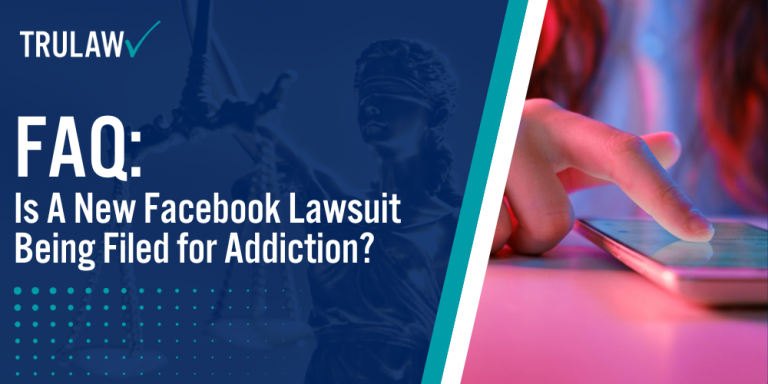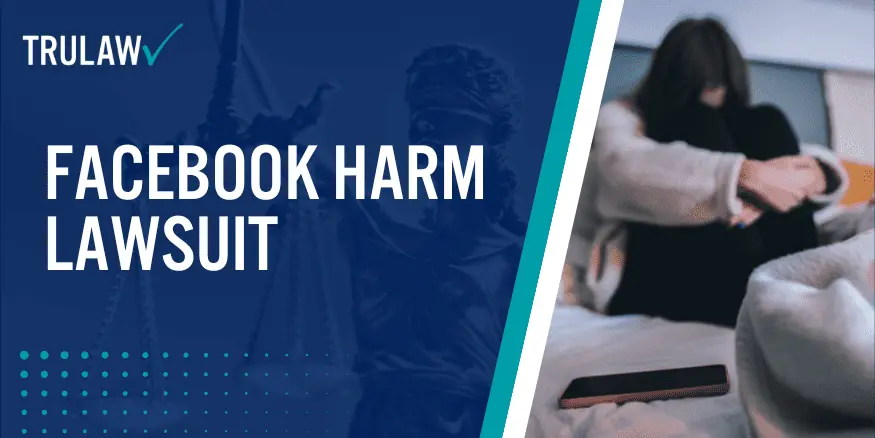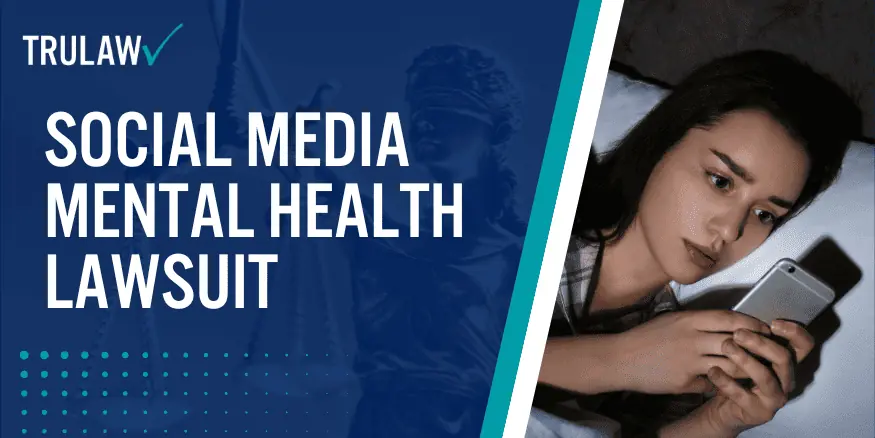TikTok Addiction Lawsuits: A Growing Trend
- Last Updated: July 9th, 2024

Attorney Jessie Paluch, founder of TruLaw, has over 25 years of experience as a personal injury and mass tort attorney, and previously worked as an international tax attorney at Deloitte. Jessie collaborates with attorneys nationwide — enabling her to share reliable, up-to-date legal information with our readers.
Legally Reviewed
This article has been written and reviewed for legal accuracy and clarity by the team of writers and legal experts at TruLaw and is as accurate as possible. This content should not be taken as legal advice from an attorney. If you would like to learn more about our owner and experienced injury lawyer, Jessie Paluch, you can do so here.
Fact-Checked
TruLaw does everything possible to make sure the information in this article is up to date and accurate. If you need specific legal advice about your case, contact us by using the chat on the bottom of this page. This article should not be taken as advice from an attorney.
Key takeaways:
- As of May 2024, a total of 455 social media addiction lawsuits have been filed in the Social Media Adolescent Addiction/Personal Injury Products Liability Litigation (MDL 3047).
- Plaintiffs in these lawsuits seek damages for medical expenses, therapy costs, and emotional distress related to TikTok addiction, challenging the platform's lack of liability for its algorithms.
- As the TikTok lawsuits progress, they may set important precedents for holding social media companies accountable for the impact of their platforms on young people's well-being.
Overview of TikTok Addiction Lawsuits
On this page, we’ll discuss TikTok addiction lawsuits, potential impact of TikTok addiction on mental health, how to file a TikTok addiction lawsuit, and much more.
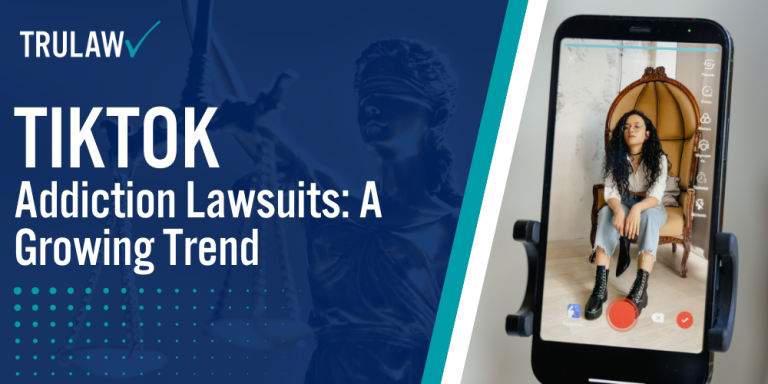
Intro to TikTok Addiction Lawsuits
Some key aspects of TikTok Addiction Lawsuits include:
- Addictive Algorithm: Claims that TikTok’s algorithm is designed to keep users engaged for prolonged periods, leading to addiction.
- Mental Health Impact: Allegations that TikTok addiction can lead to various mental health issues, such as anxiety, depression, and low self-esteem.
- Inadequate Age Verification: Accusations that TikTok does not have sufficient age verification measures, exposing minors to potentially harmful content.
- Lack of Parental Controls: Claims that TikTok lacks adequate parental control features to help prevent addiction in young users.
If you or someone you love has experienced mental health problems due to TikTok addiction, you may be eligible to pursue compensation.
Contact TruLaw using the chat on this page for an instant case evaluation to find out if you qualify to join others filing TikTok Addiction Lawsuits.
Table of Contents
Overview of the TikTok Addiction Lawsuits
Parents across the country are filing TikTok addiction lawsuits against ByteDance, claiming the social media app is designed to be addictive and exposes young people to harmful content.
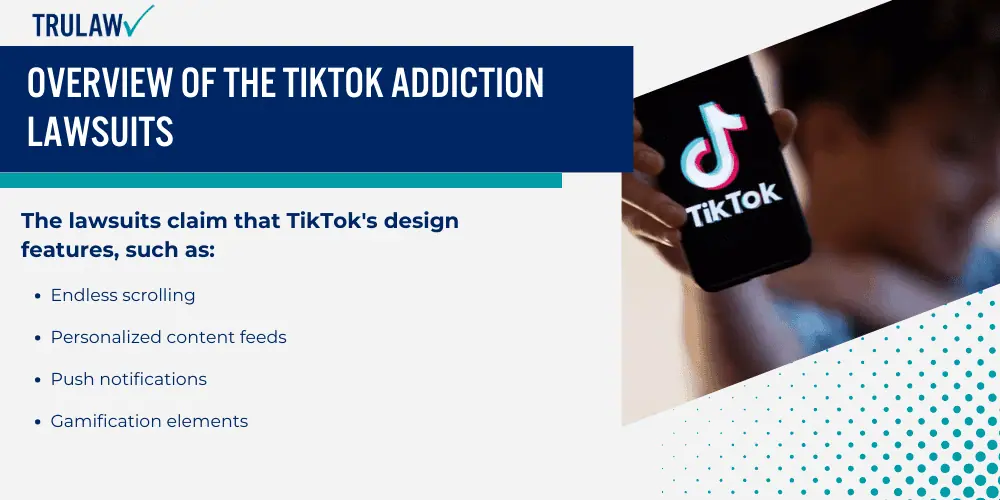
Introduction to TikTok Addiction Lawsuits Against ByteDance
The TikTok addiction lawsuits allege that the social media platform puts profit over consumer safety by using algorithms that encourage addiction among young users.
These lawsuits aim to hold ByteDance, TikTok’s parent company, accountable for the negative impact on children’s mental health.
The lawsuits claim that TikTok’s design features, such as:
- Endless scrolling
- Personalized content feeds
- Push notifications
- Gamification elements
contribute to the app’s addictive nature, leading to prolonged use and potential harm to young people’s well-being.
Prevalence of TikTok Usage and Addiction Among Teens
TikTok has experienced explosive growth since its launch in 2016, with over 834 million active users worldwide.
The app’s popularity is particularly high among younger demographics:
- 58% of Gen Z users aged 13-17 visit TikTok daily
- Children spend 61% more time on TikTok than on YouTube
- TikTok had 672 million downloads in 2022 alone
The widespread use of TikTok among young people has raised concerns about the potential for social media addiction and its impact on their mental health and well-being.
Mental Health Impact of TikTok Addiction on Young Users
Studies have linked the overuse of social media platforms like TikTok to a decline in mental health among adolescents.
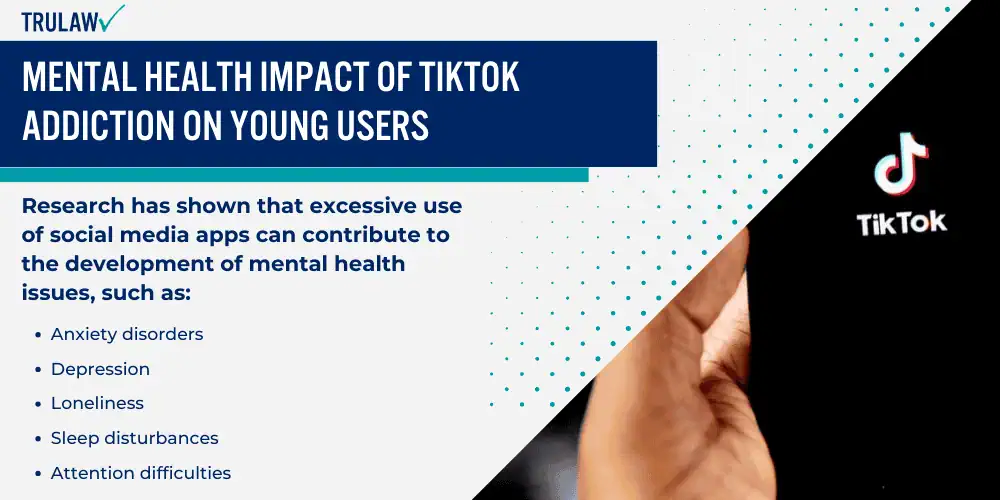
The TikTok addiction lawsuits aim to address the growing concern over the app’s impact on young users’ psychological well-being.
Studies Linking TikTok Overuse to Anxiety and Depression
Young people are especially vulnerable to the negative effects of social media, as they are still developing their self-esteem and social identities.
The endless stream of perfectly crafted videos on TikTok can create a distorted sense of reality, leading to feelings of inadequacy and social comparison, which can, in turn, trigger anxiety and depression.
Research has shown that excessive use of social media apps can contribute to the development of mental health issues, such as:
- Anxiety disorders
- Depression
- Loneliness
- Sleep disturbances
- Attention difficulties
The constant exposure to curated content and the pressure to gain popularity on TikTok may exacerbate these mental health concerns among young people.
TikTok Addiction’s Role in Poor Self-Esteem and Body Image
The TikTok addiction lawsuits also highlight the app’s potential to impact young users’ self-esteem and body image negatively.
The platform’s emphasis on appearance, social comparison, and viral trends can lead to:
- Feelings of inadequacy
- Negative body image
- Eating disorders
- Low self-worth
As young people spend more time on TikTok, they may become increasingly vulnerable to these mental health challenges, which can have long-lasting effects on their overall well-being.
Physical Health Symptoms Tied to TikTok Addiction Lawsuits
In addition to the mental health concerns, the TikTok addiction lawsuits also address the physical symptoms that some young users have experienced due to excessive use of the app.
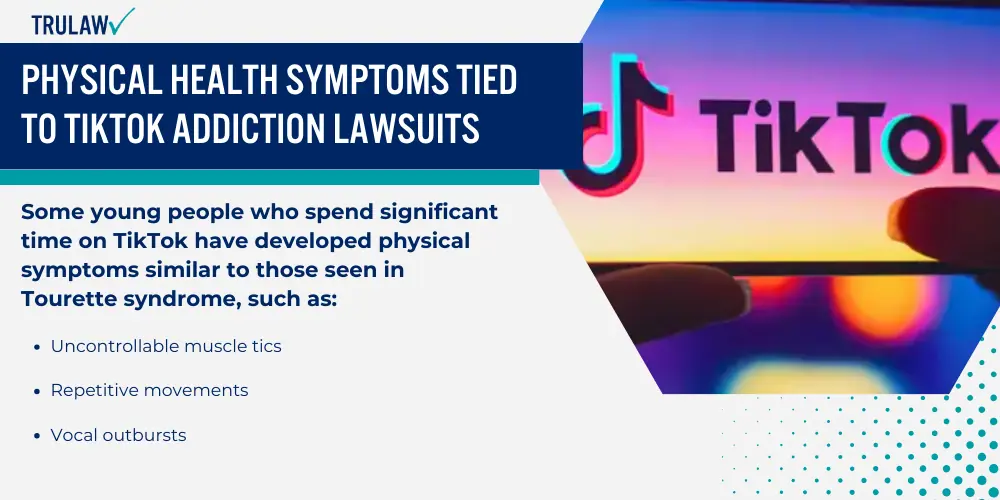
These physical health issues have been termed “social media-induced sociogenic illness.“
Social Media-Induced Tics and Tourette-Like Symptoms
While social media can be a great tool for connection and entertainment, spending too much time on platforms like TikTok may have negative consequences.
Some young people who spend significant time on TikTok have developed physical symptoms similar to those seen in Tourette syndrome, such as:
- Uncontrollable muscle tics
- Repetitive movements
- Vocal outbursts
Researchers believe that exposure to videos of people displaying these symptoms on TikTok may trigger similar behaviors in susceptible young users.
Leg Pain and Paralysis Linked to Excessive TikTok Usage
In addition to tics and Tourette-like symptoms, some young people have reported experiencing leg pain and even paralysis after engaging in prolonged TikTok use.
These physical symptoms may be related to:
- Prolonged periods of immobility while using the app
- Poor posture during extended viewing sessions
- Repetitive strain injuries from creating TikTok content
The TikTok addiction lawsuits argue that the app’s design encourages young users to spend excessive amounts of time on the platform, putting them at risk for these physical health issues.
Allegations in Current TikTok Addiction Lawsuits
The ongoing TikTok addiction lawsuits make several key allegations against ByteDance and the social media app.
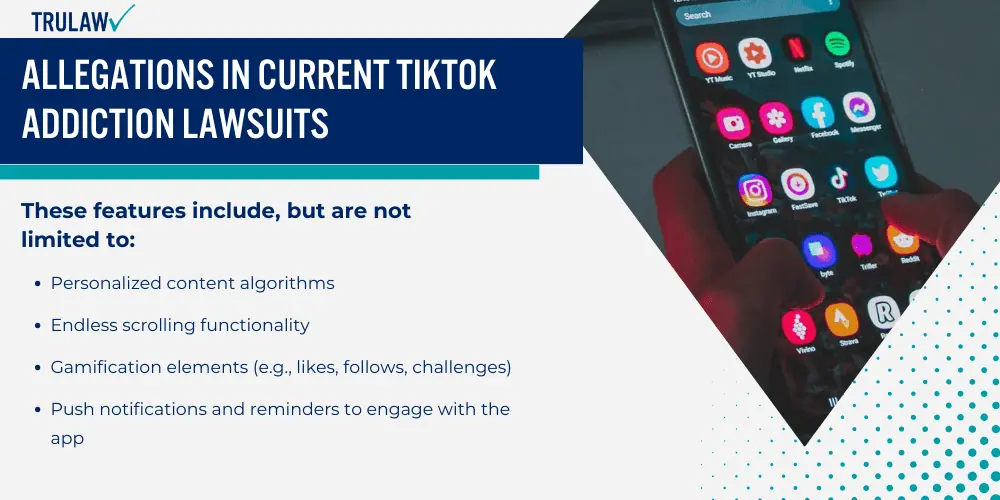
These claims focus on the intentional design of TikTok to promote addiction and the exposure of young users to inappropriate content.
Claims That TikTok Was Purposefully Designed to Be Addictive
Central to the TikTok addiction lawsuits is the allegation that the app was designed with features that intentionally promote addictive behavior among young people.
These features include:
- Personalized content algorithms
- Endless scrolling functionality
- Gamification elements (e.g., likes, follows, challenges)
- Push notifications and reminders to engage with the app
The lawsuits argue that ByteDance knowingly implemented these features to maximize user engagement and profit, disregarding the potential harm to young users’ mental health and well-being.
Complaints About TikTok Exposing Teens to Harmful Content
Another significant allegation in the TikTok addiction lawsuits is that the app exposes young people to inappropriate and potentially harmful content.
This content may include:
- Sexually explicit material
- Promotion of drug and alcohol use
- Encouragement of dangerous industry-wide challenges or stunts
- Cyberbullying and harassment
The lawsuits claim that TikTok’s algorithms recommend this type of content to young users, contributing to the development of mental health issues and risky behaviors.
Nationwide Scope of TikTok Addiction Lawsuits
The TikTok addiction lawsuits have gained momentum across the United States, with school districts and state governments taking legal action against ByteDance and other social media companies.
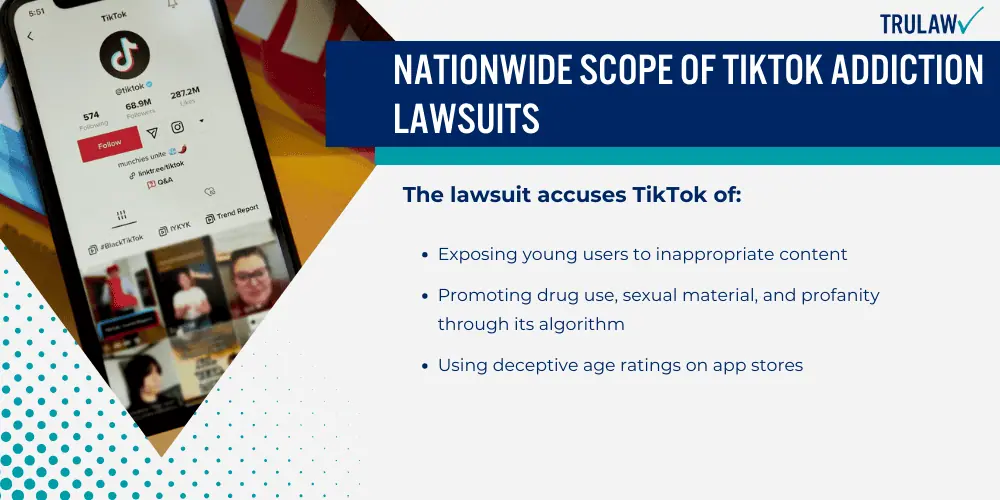
These lawsuits highlight the growing concern over the impact of social media addiction on young people’s well-being.
Seattle Public Schools Suing ByteDance Over Student Addiction
In one notable case, Seattle Public Schools filed a lawsuit against ByteDance and other social media sites, claiming that the resulting social media addiction has made it impossible for the district to educate students effectively.
The social media harm lawsuit argues that the tech companies have created a public nuisance by designing their platforms to be addictive and harmful to young people.
Indiana’s Lawsuit Against TikTok for Deceptive Practices
In 2022, Indiana became the first state to sue ByteDance for violating consumer protection laws.
The lawsuit accuses TikTok of:
- Exposing young users to inappropriate content
- Promoting drug use, sexual material, and profanity through its algorithm
- Using deceptive age ratings on app stores
The Indiana lawsuit seeks to hold companies accountable, especially Tiktok, for its alleged role in the youth mental health crisis.
It aims to force changes in the app’s design and content moderation practices.
TikTok's Responsibility in the Teen Mental Health Crisis
The TikTok addiction lawsuits argue that the company bears significant responsibility for the current teen mental health crisis.
Evidence suggests that TikTok and other social media platforms have knowingly designed their apps to be addictive, prioritizing profit over the well-being of young users.
Whistleblower Testimony on Social Media’s Impact on Teen Girls
In 2021, whistleblower Frances Haugen testified before Congress about the impact of social media apps on teen mental health, particularly among young girls.
Haugen revealed internal documents from Meta (parent company of Facebook and Instagram) that acknowledged the harmful and toxic nature of their platforms’ content.
How TikTok’s Algorithm Hooks Young People Despite Known Harms
Similar to the allegations against Meta, the TikTok addiction lawsuits claim that ByteDance has continued to operate its platform in a way that prioritizes engagement and profit, despite knowing the potential harm to young people.
TikTok’s algorithm is designed to keep young users hooked by continuously showing them content tailored to their interests, making it difficult to disengage from the app.
Legal Basis for Social Media Harm and Addiction Claims
Individuals and families who have suffered harm due to social media addiction may have grounds to file a lawsuit against companies like ByteDance.
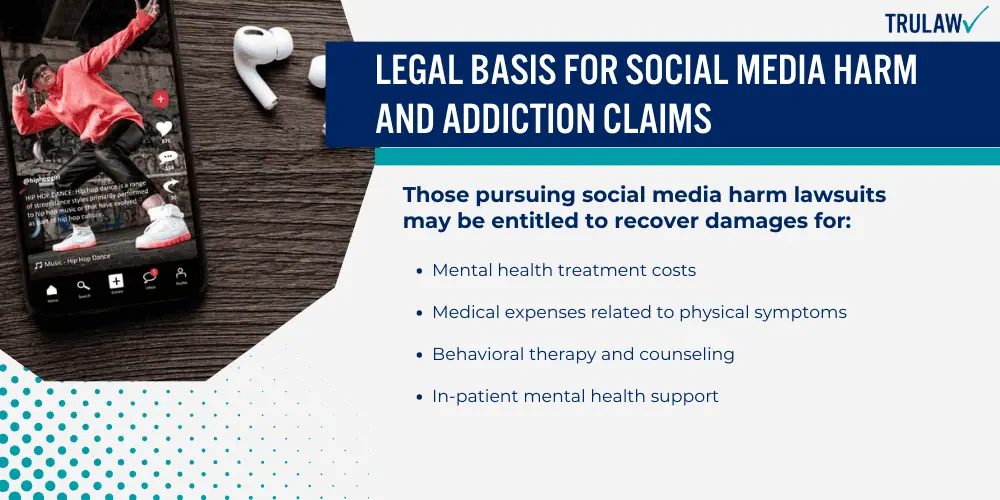
The legal basis for these claims includes seeking damages for various losses and expenses related to the addiction.
Recovering Damages for Medical Expenses and Therapy Costs
Social media addiction can lead to a variety of mental health problems, such as anxiety and depression.
These conditions can require treatment from therapists and other mental health professionals, resulting in significant costs.
Those pursuing social media harm lawsuits may be entitled to recover damages for:
- Mental health treatment costs
- Medical expenses related to physical symptoms
- Behavioral therapy and counseling
- In-patient mental health support
These damages aim to compensate individuals and families for the financial burden incurred due to the harm caused by social media addiction.
Compensation for Emotional Distress and Reputational Harm
Social media addiction can cause significant emotional distress, such as anxiety and depression.
This can lead to a loss of enjoyment in once pleasurable activities and damage relationships with friends and family.
These harms are often difficult to quantify, but social media lawsuits can seek compensation for this non-economic damage.
In addition to medical expenses, social media harm lawsuits may seek compensation for non-economic damages, such as:
- Emotional distress and suffering
- Loss of enjoyment of life
- Damage to personal relationships
- Harm to reputation or standing in the community
These damages recognize the significant psychological and social impact that social media addiction can have on an individual’s life.
Challenging Social Media's Lack of Liability for Addictive Algorithms
Historically, social media companies have avoided liability for the content posted on their platforms by invoking Section 230 of the Communications Decency Act.
However, the current TikTok addiction lawsuits are challenging this lack of accountability by focusing on the role of algorithms in promoting harmful content.
Outdated Communications Decency Act Shielding Tech Giants
The Communications Decency Act passed in 1996, has shielded social media companies from liability for user-generated content.
However, critics argue that this law is outdated and fails to address the current landscape of social media platforms, where algorithms play a significant role in determining what content users see.
Arguing Algorithms Make Platforms Responsible for Toxic Content
The TikTok addiction lawsuits contend that social media companies are actively shaping users’ experiences by using algorithms to recommend and promote specific content.
This argument seeks to hold platforms like TikTok accountable for the harmful content their algorithms push to young users rather than merely hosting user-generated content.
As the TikTok addiction lawsuits progress, they may set important precedents for holding social media giants responsible for the impact of their platforms on young people’s mental health and well-being.
These lawsuits aim to bring about changes in the design and operation of social media apps to prioritize user safety and mitigate the risks of addiction and harm.
Frequently Asked Questions
-
What is the New York City Health Department's stance on social media addiction?
The New York City Health Department has declared addictive social media platforms a public health hazard, citing the youth mental health crisis.
The department announced a lawsuit against major social media companies and an action plan to support teens’ well-being.
-
How much does New York City spend on youth mental health programs?
New York City spends around $225 million annually on youth mental health programs.
The city aims to combat the childhood mental health crisis exacerbated by excessive social media use and the addictive nature of these platforms.
-
What measures are being demanded from social media companies to protect young users?
Lawsuits and public officials demand that social media companies implement industry-leading safeguards, such as parental controls, age-restricted features, and age-appropriate experiences online.
These measures aim to reduce the harmful impact of social media on children’s mental health.
-
What role do algorithms play in promoting harmful content to young users?
Social media algorithms are designed to increase user engagement by encouraging passive scrolling and showing a non-stop content stream.
However, this can expose young users to harmful content, such as self-harm and eating disorder-related posts, contributing to mental health struggles.
-
How can parents and experts help young people navigate the online world safely?
Parents and experts can support teens’ well-being by setting boundaries for social media use, encouraging open communication about online experiences, and promoting healthy offline activities.
Parenting experts also recommend using available parental controls and staying informed about the potential risks of social media platforms.
-
What are the common allegations in TikTok addiction lawsuits?
The allegations in TikTok addiction lawsuits typically focus on the platform’s use of algorithms that prioritize engaging content, potentially leading to harmful behaviors like self-harm and eating disorders in users, especially minors.
Plaintiffs argue that TikTok failed to modify its platform to prevent these risks, constituting negligence and a breach of duty.
-
How could TikTok be held responsible for harming teenage users?
TikTok could be held responsible under several legal theories, including negligence for failing to protect users from known risks, product liability for harmful platform design, fraudulent misrepresentation if they misrepresented the safety of their platform, and violations of consumer protection laws for deceptive practices.
-
Are these TikTok lawsuits class actions?
No, the current TikTok addiction lawsuits are not class actions but are individual cases grouped as mass tort.
This means each plaintiff files separately, although they share common issues regarding TikTok’s alleged harmful practices.
-
Who is eligible to file a social media addiction lawsuit against TikTok?
Individuals, particularly minors, who have experienced significant mental health declines due to extensive social media use might be eligible.
Parents can also initiate claims on behalf of their children if they can demonstrate that social media’s addictive nature contributed to the child’s psychological harm.
-
How do I begin the lawsuit process against TikTok?
To begin a lawsuit process against TikTok, it’s advised to consult with legal professionals experienced in handling social media addiction claims.
They can offer guidance based on the specifics of the harm suffered and navigate the legal challenges of these types of lawsuits.

Experienced Attorney & Legal SaaS CEO
With over 25 years of legal experience, Jessie is an Illinois lawyer, a CPA, and a mother of three. She spent the first decade of her career working as an international tax attorney at Deloitte.
In 2009, Jessie co-founded her own law firm with her husband – which has scaled to over 30 employees since its conception.
In 2016, Jessie founded TruLaw, which allows her to collaborate with attorneys and legal experts across the United States on a daily basis. This hypervaluable network of experts is what enables her to share reliable legal information with her readers!
You can learn more about the Social Media Harm Lawsuits by visiting any of our pages listed below:
Here, at TruLaw, we’re committed to helping victims get the justice they deserve.
Alongside our partner law firms, we have successfully collected over $3 Billion in verdicts and settlements on behalf of injured individuals.
Would you like our help?
At TruLaw, we fiercely combat corporations that endanger individuals’ well-being. If you’ve suffered injuries and believe these well-funded entities should be held accountable, we’re here for you.
With TruLaw, you gain access to successful and seasoned lawyers who maximize your chances of success. Our lawyers invest in you—they do not receive a dime until your lawsuit reaches a successful resolution!
Do you believe you’re entitled to compensation?
Use our Instant Case Evaluator to find out in as little as 60 seconds!
Camp Lejeune’s water contamination issue spanned several decades starting in the 1950s. Exposure to these chemicals has been linked to various serious health issues, including cancer, organ diseases, and death.
Research is increasingly suggesting a link between the use of Tylenol during pregnancy and the development of neurodevelopmental disorders, such as autism and ADHD, in infants.
Legal action is being taken against manufacturers of Aqueous Film-Forming Foam (AFFF), a chemical used in fighting fires. The plaintiffs allege that exposure to the foam caused health issues such as cancer, organ damage, and birth and fertility issues.
Here, at TruLaw, we’re committed to helping victims get the justice they deserve.
Alongside our partner law firms, we have successfully collected over $3 Billion in verdicts and settlements on behalf of injured individuals.
Would you like our help?
